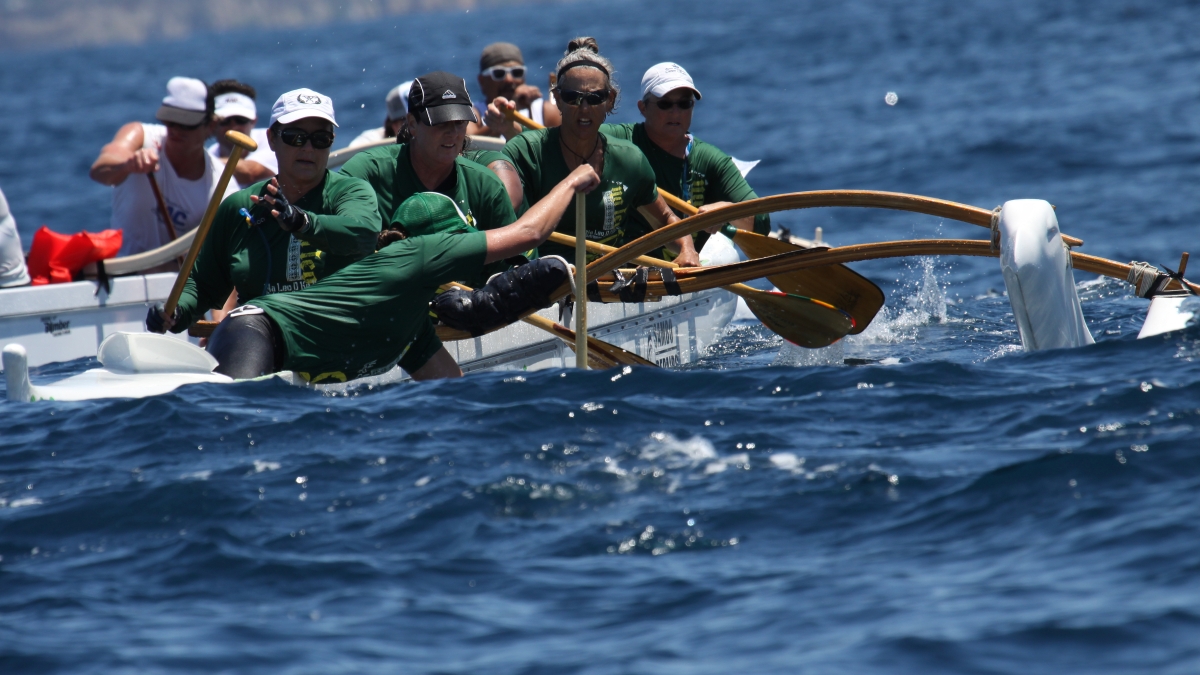ASU staff, students among amateur athletes to compete for US

When the Olympic Games open in London on July 27, a small band of Arizona’s elite canoe paddlers will be preparing to pit their skills against the best in the world, but in Canada at the International Va’a Federation (IVF) Outrigger World Sprint Championships in Calgary, Alberta.
The paddlers, who are quick to tell you they are not rowers, are Kehaulani Young, Alicia Lin-Kee, Terry Santiago, Anne Cook, Catherine Hershfelt, Marisalyn Singpradith and Margaret Coulombe. The team, the first ever from Arizona, will race against competitors from 22 countries, Aug. 11-15.
Coulombe, Cook and Singpradith will also be carrying the banner of Arizona State University with them into battle. The group trains on Tempe Town Lake four times a week, during temperatures that often soar into the triple digits; a challenge that makes their journey to Worlds just “that more compelling,” says Cook, who is a graduate student in ASU’s School of Social Work.
The racers are members of Na Leo O Ke Kai (or Voices of the Sea), the largest competitive outrigger canoe club in Arizona. This nonprofit group supports the athletic dreams of more than 120 members, who come from all across the Valley and as far as away as Lake Havasu. Club members, men, women and children, paddle all year round, and race in Arizona, California, Hawaii and Canada from April to October.
“Outrigger canoe is a huge part of my upbringing. I grew up on Molokai, with both of my parents paddling competitively in Hawaii,” said Lin-Kee, who is a mother of two little boys. “I fell in love with the positive attitudes and energy in the sport. It’s something I want my boys to experience and share.”
Much like the fondly-remembered Jamaican bobsled team – underdogs of the 1988 Olympics – Arizona’s land-locked World Sprint crew strives to be crowned fastest in the world. They have trained together since 2011 and qualified this last March. However, the paddlers themselves have competed for up to 17 years in canoes. The Arizona team will be part of a larger group of men and women drawn together to represent the U.S. from four IVF-U.S. regional groups in California, the Pacific Northwest, the eastern U.S., and Hawaii. And while outrigger canoe is not yet an Olympic sport, the top teams attract some of the best canoeists in the world, including present and former Olympians and Paracanoe athletes.
The va’a or outrigger canoe originated in Hawaii nearly 4,000 years ago and a sailing version of the canoe was used to populate islands chains throughout Polynesia. The modern sport has likewise spread from Tahiti and Hawaii across the United States, Canada, South America, Europe and Asia. Traditional boats in Hawaii were made of the native tropical hardwood, koa, which has become rare. Modern racing canoes are lightweight, from 250-400 pounds, typically made of fiberglass or other lightweight man-made materials.
Calgary crewmates Singpradith and Santiago also paddle or coach dragon boat with the Arizona Dragon Boat Association. Both joined Na Leo O’ Ke Kai to expand their skills as competitive paddlers. “I found more than what I bargained for!” said Singpradith, who is an ASU alumnus. “Whether it’s one or 60 paddlers, Na Leo O’ Ke Kai has showed me what it is to be one team striving to bring out the very best in the community.”
Arizona’s Na Leo O Ke Kai Outrigger Canoe Club has been a feeder club for the establishment of five other canoe clubs in the Southwest. Founded by Louise and Lono Navarro in 1997, the group offers much more than a high level of competition. It also has summer paddling programs for Native American and other local youth, promotes team work and leadership, as well as an understanding of Polynesian culture and heritage, and a close family atmosphere or Ohana.
“Even though I am not Hawaiian, growing up with Hawaiian traditions has been a blessing and this culture continues to bring many new experiences into my life,” said Hershfelt, a dental hygienist who learned to paddle in Northern California at age 6.
“Our Calgary crew has students, mothers, retired Air Force and active members of the Arizona Army National Guard; women working at universities; professionals working with Honeywell Aerospace, Honeywell Defense and Space and American Express. I am constantly impressed by my teammates, their dedication and feel fortunate to be part of the first team to represent Arizona as part of a U.S. team in Calgary,” said Coulombe, the club’s head coach and staff member with ASU’s College of Liberal Arts and Sciences.
Despite training hard for the race itself, the sprint crew’s challenges still include one more major hurdle – fundraising. They are asking the public for their support. To find out more about the group http://outriggeraz.org, the competition www.vaaworldsprints2012.com or to help support the crew: https://www.wepay.com/x1tkoza/donations/donations-to-get-na-leo-o-ke-kai-to-canada-world-competition.
What’s ahead after Worlds? Coulombe hopes to bring the sport of outrigger to ASU, working with John Parker, a lecturer with Barrett Honors College, and ASU students to establish a student club, with support from partner Na Leo O Ke Kai.